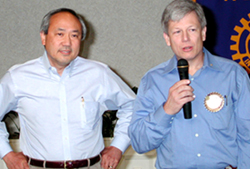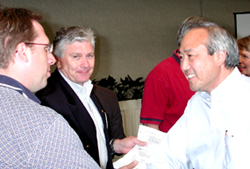|
|

Rick Klobucher [R] introduces Friday’s speaker, Skip Lee.
|
Rotarians were treated to a fascinating program on the Agros (pronounced ah-gross) Foundation by its founder Skip Lee of Seattle. “Agros is a blend of microlending meeting Habitat for Humanity,” Lee explained. “Since 1982, Agros has grown to where it is becoming a force in helping break the cycle of poverty.”
Lee, a Seattle lawyer, joined with others to form Agros 19 years ago. “The concept was to collect private funds to help purchase land which could then be ‘sold’ to the people who would repay the capital costs from the production on the land. Part of the concept envisions homes being constructed on the land, which the people will work off until it’s theirs.”
Using the premise that a picture is worth a thousand words, Lee then introduced a short video, which showed how the program works. With projects primarily in El Salvador, Guatemala, and Nicaragua, Agros buys chunks of land, which it then helps a village to clear and ready for planting. The Foundation provides seeds, constructs irrigation systems, and spearheads marketing efforts for the crops. At the same time, teams of volunteers come to the newly acquired area and begin establishing village water systems, building health clinics, churches, schools, community clubs, and individual homes. Each village has its own governing body.
|

Skip Lee talks with Scott Hildebrand [L] and Brian Evison.
|
Lee said that Agros has become a model of collaboration. “We have partnered with many churches, particularly Bellevue First Presbyterian and University Presbyterian, and have proven that our model works, since we will be sending 20 work teams to Latin America this year, many of those parent-child teams. In 19 years, we have established 11 new villages in Guatemala, 2 in El Salvador, and 1 in Nicaragua. The village sites contain from 80-800 hundred acres, supporting 20-65 families, or 150-500 people.”
The Agros goal is to help these people help themselves. “We stress developing good housing with clean drinking water. We help the townspeople plants new crops, such as broccoli, carrots, cabbage, and potatoes. In addition to the self-governing council, the women of each village have their own committees, tackling major issues. Democracy is flourishing in these places.”
Agros has developed a system of loans for micro enterprises, with the goal to create employment and become self-sufficient. “We are seeing these people stepping back from the brink, breaking the cycle of poverty and seeing that the children will never have to live in the grinding poverty of their parents. Our greatest joy is that kids can be kids in this atmosphere.”
Agros projects one thousand new villages by the year 2020. Lee said, “We’re looked upon as a bunch of crazy people believing in miracles … we are and we do! We hope that other organizations will take our model and make it happen elsewhere in the world. Our five-year goal is to open 200 new villages in Latin America, India, and Africa. We’d like to add Mexico and Brazil as well.” The average cost to set up a village is $375,000. The funding is totally private.
“We are blessed to provide a chance for people to transform their lives,” Lee concluded. “We see that the cycle of poverty can be broken, which will bring a material and spiritual awakening,” not to mention the political implications of stability to these volatile parts of the world. For more information about Agros, visit their website. Their motto pretty well sums up their objectives: “Land. Hope. Life.”
Thanks to Rick Klobucher for his introduction.
|